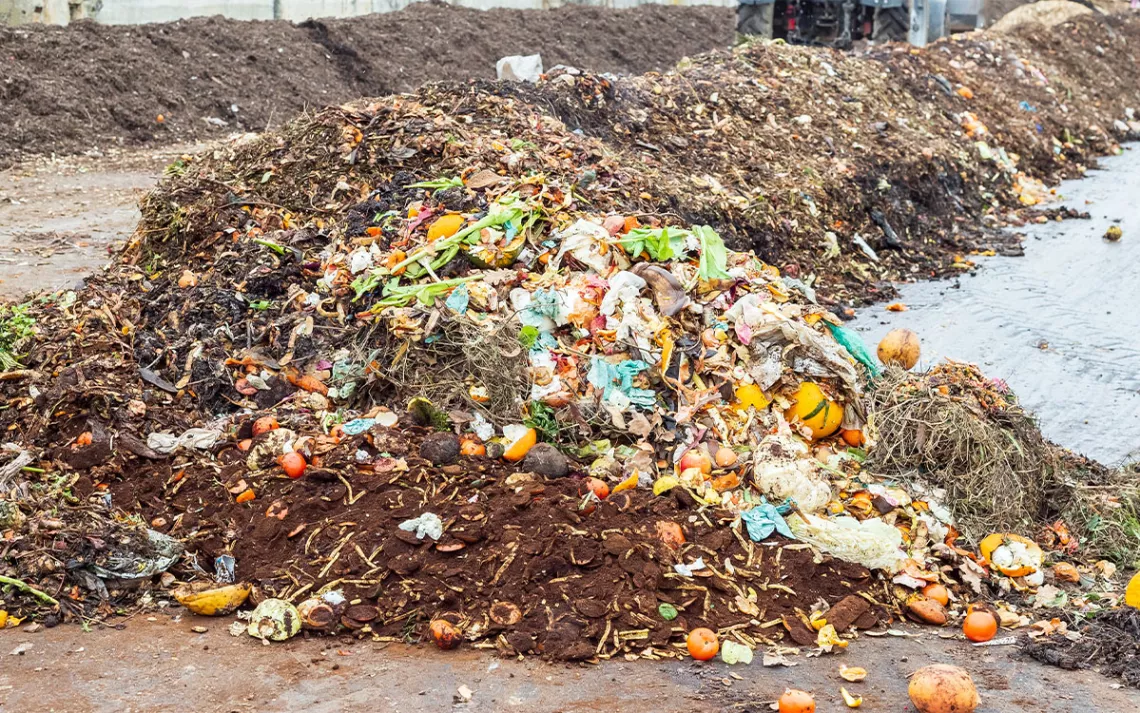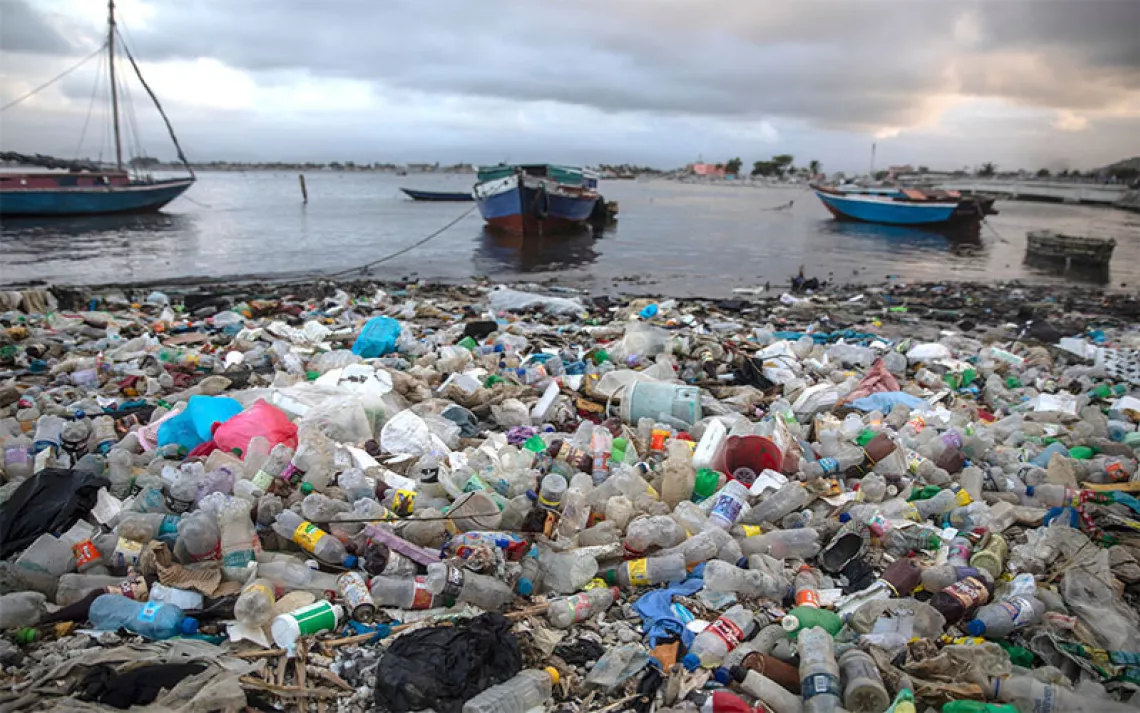Locals Paved the Way for Chicago's New Composting Program
Can the city’s food scrap drop-off initiative work in harmony with existing businesses?

Collected organic waste at landfill. | Photo by AnSyvanych/iStock
This past March, I stood atop 850,000 tons of garbage entombed beneath the ground of a retired landfill on the edge of Chicago’s South Side. Though the landfill is decommissioned, it’s far from deserted—in fact, the crest of this landfill is a frenzy of activity. Operators steer front loaders laden with dirt and other debris back and forth, between grinding, churning machinery. It’s windier up here than it was down below, where I began my tour of Whole Earth’s Harbor View Composting Facility with administrative coordinator Denise Macias. There’s a smell in the air, slightly sour but not altogether unpleasant, similar to inhaling deeply from a handful of rich soil.
Most of Chicago’s compost ends up here at Harbor View, brought by independent collection and hauling companies, including Urban Canopy, Collective Resource, and WasteNot—and more recently, the City of Chicago’s food scrap drop-off program. The municipal program, which launched in October 2023, offers seventeen sites scattered around the city where Chicagoans can drop off their compostable materials for collection—and it all ends up at Harbor View. As the only commercial composting facility within Chicago city limits, Harbor View was the obvious choice for the city’s composting needs. “They [the city] came right to us,” said Macias.
The City of Chicago is late to the municipal composting game, especially in comparison to other sustainably-minded metro areas. San Francisco began curbside composting pickup in 1996. Seattle began curbside food waste collection in 2005. More recently, Los Angeles launched curbside compost collection in January 2023. New York City is slowly rolling out curbside compost collection, with plans to service all five boroughs by the end of 2024. Now, with a city program and several private organizations, Chicago is on its way to becoming a composting powerhouse – but it’s not without hurdles, and it may be difficult to catch up.
According to the Environmental Protection Agency, food accounts for 24 percent of municipal solid waste, making it the single most common material sent to landfills. In 2022, the Illinois Environmental Protection Agency released a report stating that the 36 landfills currently operational in the state only have another 19 years of capacity, based on the previous five years’ disposal rates. The four landfills that specifically serve Chicago and the surrounding suburbs only have about five years left.
Before the city got started, local citizens paved the way to help the city fill its compost gap. “I would argue that the gap saw me,” Liam Donnelly, founder and CEO of WasteNot, Chicago’s largest compost collection company, said. In 2015, Donnelly began collecting compost from nearby residents and businesses with a trailer hitched to the back of his bike. Today, WasteNot operates the largest fleet of electric waste management vehicles in the country, collecting compost from customers' doorsteps. Another composting company known as Block Bins began in 2018, offering a service to Chicago residents like the regular garbage pickup they are accustomed to—black carts hosted by homeowners in alleyways that nearby residents can sign up for as their drop-off sites. “Chicago seemed really dissuaded by the logistical challenges of a composting program and organics program,” Dane Christianson, the CEO of Block Bins, said. “So that’s why we built it ourselves.”
The success of these independent composting companies underscored Chicagoans’ desire for an effective citywide composting system. And in September 2023, the city issued a Materials Management Strategy Progress Updates press release announcing goals to, “[i]dentify partnership and support opportunities for industrial, commercial, and institutional entities implementing food waste diversion programs.” With composting businesses already operating in Chicago’s composting scene, the city seemed poised to implement a program with support from its own sustainability-minded residents. Yet, of the three compost collection companies I interviewed (WasteNot, Block Bins, and Urban Canopy), the City of Chicago failed to consult a single one before launching their food scrap drop-off program. “You’d think they would have,” said Tom Straus, co-lead of Urban Canopy’s Compost Club.
To address citizens’ desire, the city took a different approach, joining the National Resources Defense Council’s Food Matters Initiative as part of the Great Lakes cohort, along with Cincinnati and Franklin County, Ohio; Madison, Wisconsin; and Detroit, Michigan. Minneapolis was also a major influence when it came to developing Chicago’s food scrap drop-off program, said Chris Sauve, who is the deputy commissioner of the Chicago Department of Streets and Sanitation. “We had two or three different conversations with the folks up there, who were very helpful and very open in talking about … what a program would or could or should look like,” Sauve said. With a composting pilot program by 2008 and a citywide curbside collection system by 2016, Minneapolis had set a good, and timely, example.

Make every day an Earth Day
Get articles like this one sent directly to your inbox.
With this action you affirm you want to receive Sierra Club communications and may vote on policy designated by the Sierra Club Board.
Chicago’s food scrap drop-off program appeared suddenly, much to the surprise of local compost business owners: “The city’s press release was the first we’d heard about it,” Donnelly said in regard to the launch of Chicago’s food scrap drop-off program. In 2022, Block Bins organized a meeting with Chicago’s Department of Streets and Sanitation, but nothing came of it. “They really talked to us only when they wanted information about how to solve specific problems, and it's clear that they were just using that information to then develop another solution of their own,” Christianson told me. “They took a lot of our advice, but . . . why only 17 locations? When we have 800 locations where they need to be? Like, why did you do this?”
WasteNot has also been puzzled over the city’s actions, as their requests for a meeting about the municipal pilot program have gone unanswered. “We’re really interested in understanding how WasteNot needs to adapt and prepare for a future we hadn’t anticipated before,” Donnelly said. As local businesses are left wondering what a city program will mean for them, Sauve said, “They're servicing customers that find it convenient, that have the means to pay for it. We’re not looking to impact that, but we did need to provide our own option and provide a path forward for what we need to do as a department.” While the city’s program is free, for some Chicagoans the cost of their composting service (Block Bins, WasteNot, and Urban Canopy are all subscription-based programs) was the push they needed to commit to the lifestyle change that composting can entail. “I feel like since I'm not actively paying, there's less motivation to actually go over to the [city’s] free site and drop off my compost,” said one Jefferson Park resident.
It remains to be seen whether Chicago can host this plethora of compost solutions, yet the city’s program has seen a steady increase in traction. As of May 10th, 2024, around 4,800 households were signed up to participate, and 109 tons of compost had been collected since the program began in October. For comparison, Chicago’s famous “Cloud Gate” sculpture, also known as “The Bean,” weighs about 110 tons.
Despite early challenges and confusion from established businesses, Chicago now has more compost offerings than ever, making a “greener” lifestyle more accessible for more residents in whatever way they choose. And that can’t be a bad thing. As WasteNot’s Donnelly said, “Composting is the gateway into sustainability.”
 The Magazine of The Sierra Club
The Magazine of The Sierra Club



